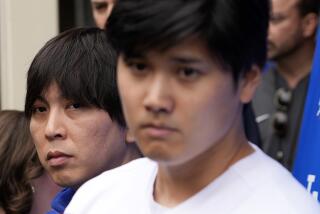Japan Hints It May Suspend Nomura Trading : Securities: A government document suggests that the brokerage may have illegally manipulated stock prices.
- Share via
TOKYO — Japan’s finance minister said Tuesday that his ministry is expanding its inquiry of Nomura Securities Co., which allegedly recommended a railway company’s stock to customers after a client with underworld connections had made large purchases of it.
Also Tuesday, a Socialist lawmaker said a Finance Ministry document he obtained shows that Nomura, the world’s largest brokerage, illegally drove up the price of Tokyu Corp. shares, earning the underworld figure millions of dollars.
Finance Ministry officials said the document was not an official ministry report. But Kyodo News Service quoted an unidentified Finance Ministry official as saying that the ministry is considering temporarily suspending Nomura from conducting business because of the alleged stock manipulation.
Testifying in Parliament, Finance Minister Ryutaro Hashimoto did not explicitly accuse Nomura of stock manipulation, which is illegal in Japan. But he said “there were problems” with its trading of Tokyu Corp. shares and that his ministry was investigating its trading activities.
Socialist Toshihisa Matsuura said the document he obtained concludes that Nomura began illegally pushing up Tokyu share prices after purchases by Susumu Ishii, the former boss of the Inagawa-kai gangster group.
Ishii, who died Tuesday in a Tokyo hospital at age 67, bought 10 million shares of Tokyu stock from Nomura and 14 million shares from Nikko Securities Co. between April and August, 1989, according to the document.
Ishii ran the Inagawa-kai from 1986 until he retired in October, 1990. As chairman, he led the syndicate’s move into real estate and stocks, two areas where heavy market speculation sent prices skyrocketing.
The Inagawa-kai is known for its emphasis on sophisticated business dealings. Although the 8,200-member syndicate ranks second in size to the nearly 30,000-member Yamaguchi-gumi, it has a far stronger base in Tokyo, where many of Japan’s financial institutions are headquartered.
The document, circulated by Matsuura, says Ishii gained $5.9 million in profits by selling back part of his Tokyu holdings shortly before the issue hit a high of $22 on Nov. 17, 1989. He bought the stock between $11 and $13.
Former Nomura Chairman Setsuya Tabuchi denied last week before a lower house committee investigating the scandal that Nomura had illegally manipulated stock prices.
He also denied separate allegations that Nomura compensated favored clients for trading losses after March, 1990, when share prices on the Tokyo Stock Exchange began to plunge drastically.
Such compensation is illegal if promised in advance.
However, Nobuhiko Matsuno, head of the Finance Ministry’s Securities Bureau, testified Tuesday that ministry investigators have evidence that Nomura may have compensated clients after March, 1990.
Hashimoto also told Parliament that his ministry is considering a revised securities law that would allow authorities to confiscate the profits of “dubious clients” who profit through illegal transactions.
Senior officials of the Nomura, Nikko, Daiwa and Yamaichi securities companies, as well as presidents of three major banks involved in a series of fraud scandals, are to testify in Parliament’s upper house today and Thursday.
Since the far-reaching stock scandal broke out in Japan two months ago, Hashimoto, a prime minister hopeful, has been under pressure to resign.
More to Read
Sign up for Essential California
The most important California stories and recommendations in your inbox every morning.
You may occasionally receive promotional content from the Los Angeles Times.










